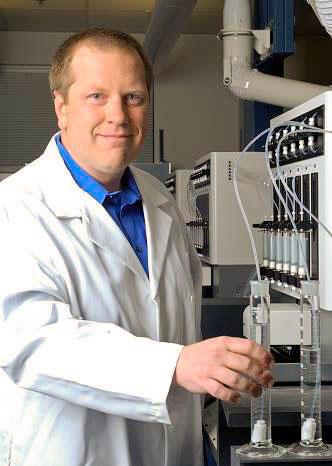Water Contaminant Expert Joins UA Engineering Research Team
Shane Snyder is joining the UA College of Engineering as a professor of chemical and environmental engineering.
In 1998, Snyder discovered that estrogens and pharmaceuticals were common contaminants in North American waters. His research has been hailed as the first in North America to link the presence of trace steroids to reproductive problems in fish.
Much of his research has centered on Lake Mead and the Colorado River, which provides water for more than 30 million people, or 10 percent of the U.S. population.
Snyder's research focus is on the fate, transport, and treatment of what are known as "emerging contaminants," such as endocrine-disrupting compounds, perchlorate, nanoparticles, and pharmaceuticals.

Research by Snyder and others has revealed that U.S. drinking water commonly contains trace amounts of pharmaceuticals, insect repellents, flame retardants, and an array of potential endocrine-disrupting chemicals. Many of these compounds originate in wastewater discharged into rivers and lakes.
Several of these chemicals have been linked to abnormalities in fish and there is growing concern about the implications for public health. In water-scarce regions of the world, including Arizona, water reuse is essential for sustainability, and Snyder's research is recognized as a critical component of water reuse projects.
Interdisciplinary Approach to Sustainability
College of Engineering dean Jeff Goldberg said he was looking forward to Snyder taking a lead role in College and campus water research. "The water issues of the Southwest lead to some of the most exciting and important engineering problems of our time," Goldberg said. "To sustain the growth rate of people moving into Arizona, we are going to have to engineer water reuse systems, and Dr. Snyder's research has a direct application in water reuse."
At UA, Snyder says he plans to bring together municipal and private sector water experts who are interested in addressing challenging water sustainability issues. "I envision a strong interdisciplinary approach that encompasses various colleges, departments, and centers from across the UA and among leading academic institutions globally," Snyder said.
Snyder's research on emerging contaminants and sustainable engineered systems for water reuse will play an important role in the planning and design of sustainable cities. "Considering the far reaching consequences of climate change and burgeoning human pollution and urban density, the demand for clean, sustainable water will continue to escalate," Snyder said.
"By fostering interdisciplinary teams," Snyder added, "I hope to develop an integrated research program that will consider the effects of changing freshwater flows and urban demand on economic, societal, and public health aspects of sustainable water systems."
Snyder will be part of the School of Sustainable Engineered Systems, which is directed by professor Pierre Deymier, who described Snyder as "a perfect example of the research philosophy of the newly formed School of Sustainable Engineered Systems in the College of Engineering."
Deymier echoed Snyder's global perspective of this area of research. "Dr. Snyder will be a catalyst for water-related research in the School and will be an asset in developing interdisciplinary research initiatives and programs in water quality and sustainability," Deymier said. "Not only across campus, but also between the University of Arizona and other institutions in the nation and the world."
Deymier also expects Snyder's research to complement several other engineering research areas in which UA plays a leading role. "I anticipate involvement in research on water issues related to a variety of established industries important to the state, like semiconductor manufacturing and mining, and in emerging industries such as those dealing with renewable energy," Deymier said.
National Reputation
In 2008, Snyder was one of six experts to testify before the U.S. Senate regarding pharmaceuticals in U.S. waters. In 2009, Snyder's research team published the first national survey of pharmaceuticals in U.S. drinking water.
Snyder will establish a lab in the College of Engineering that will conduct research into advanced technologies for water treatment. Snyder will also be co-director of the Arizona Laboratory for Emerging Contaminants, or ALEC. The lab's other co-director is Jon Chorover, professor of environmental chemistry in the department of soil, water and environmental science, which hosts the lab. The ALEC provides advanced facilities for researchers in Arizona's three state universities to analyze a wide range of emerging contaminants.
For the last decade, Snyder has been research and development project manager for the Southern Nevada Water Authority. He received a bachelor's degree in chemistry from Thiel College in Pennsylvania and a dual doctorate in environmental toxicology and zoology from Michigan State University. He also served as an associate adjunct professor at the University of Nevada, Las Vegas.
Snyder has published more than 90 papers and book chapters on the detection and treatment of endocrine disruptors and pharmaceuticals in water. He has served two terms on the U.S. Federal Advisory Committee for the EPA's Endocrine Disruptor Screening Program, and has served on two expert panels for the EPA's Candidate Contaminant List III.
Snyder also is the co-founder and vice president of Total Environmental Solutions Inc., which was founded in 1999, and offers consulting and laboratory services to government, municipal, and private sector clients.


